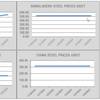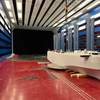The Senate Armed Services Committee approved a $517.7b fiscal 2007 defense authorization bill, a 4 percent increase over the amount authorized by Congress last year. The bill, which includes a $50b bridge fund to pay for operations in Iraq and Afghanistan during the first six months of fiscal 2007, totals $4.8b more than authorized by the House Armed Services Committee. The Senate panel, which met behind closed doors, boosted funding for several weapons programs, including the addition of $1.5b to the Navy's shipbuilding accounts, largely due to concerns about the "declining size of the fleet," according to a summary of the bill released by the committee. The LPD-25 expeditionary warfare ship, the Navy's top unfunded priority, was the clear winner among shipbuilding programs, receiving $1.3b from the panel. But the committee also said it wants to advance procurement of the CVN-21 aircraft carrier and the LHA(R) amphibious assault ship.
The senators also added $85m to the budget for the Virginia class submarine, but they did not authorize funds to let the Navy buy two submarines a year by 2009, as their House colleagues did. The Navy has resisted any efforts to buy two subs annually before 2012, saying any change would disrupt its overall shipbuilding plan. The bill would also repeal a provision in the fiscal 2006 defense authorization bill that has required the Navy maintain a 12-carrier fleet despite the service's plans to retire the historic USS John F. Kennedy. On missile defense programs, the committee authorized the president's full request. By comparison, the House committee trimmed $185.5m from the programs, making a conference fight over missile defense likely. But Senate Armed Services members did reduce funding for certain systems, including the Kinetic Energy Interceptor, to fund "more urgent" missile defense requirements, according to the committee summary. The panel also included a provision requiring an annual report on the Defense Department's plan to shift the systems from the Missile Defense Agency to the military services.
For the protection of ground forces, the panel authorized a $950.5m increase, including $559.8m for up-armored Humvees, and $100m for vehicles to counter improvised explosive devices, the greatest cause of U.S. casualties in Iraq. And they set aside $2.1b for the Joint Improvised Explosive Device Defeat Fund to advance development of new technologies and tactics, and $45.8m for various IED countermeasure technologies. The committee also agreed to permit the Defense Department to lease or lend personnel protection equipment to allies and coalition partners working with the U.S. military during contingency operations. (Source: GovExec.com)
Sponsored Content
Innovative Hull Maintenance: Profitable & Green

Subscribe for
Maritime Reporter E-News
Maritime Reporter E-News is the maritime industry's largest circulation and most authoritative ENews Service, delivered to your Email five times per week













